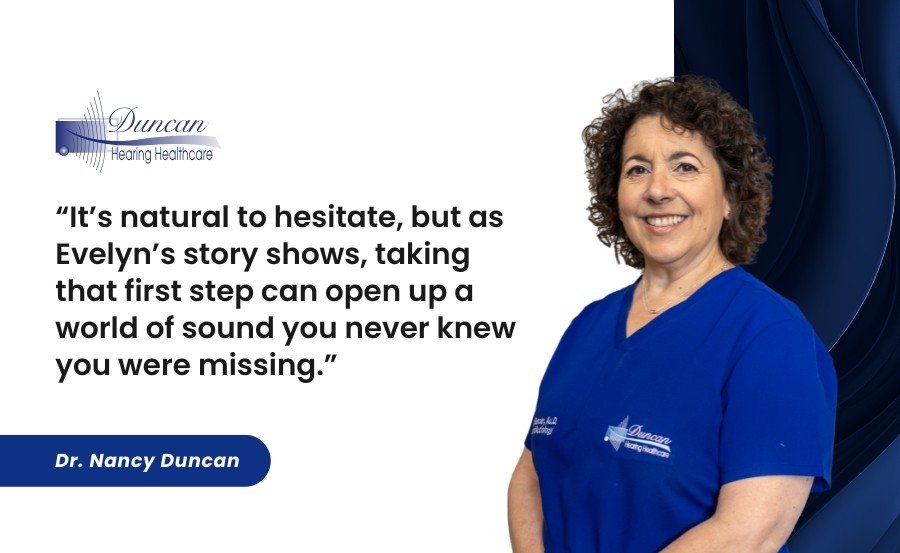May 10, 2024
|
Nancy Duncan, Au.D.
The Silent Epidemic: Noise-Induced Hearing Loss in Children
When we think of hearing loss, many of us assume it’s something that happens as we get older. However, noise-induced hearing loss is becoming a significant issue in younger generations, especially children.
According to the American Academy of Pediatrics, around 12.5% of U.S. children ages 6 to 19 already experience some level of hearing loss due to exposure to loud noise – and this number is only expected to rise.
Why Is the Hearing of Children at Risk?
Noise-induced hearing loss is not just caused by a sudden, loud sound like an explosion. Instead, most damage occurs gradually from extended exposure to loud noises over time. Today’s post-industrial world is filled with excessive noise—whether it’s motorcycles, concerts, power tools, or headphones—that the human ear was never designed to handle regularly.
Historically, our ancestors listened for subtle sounds in nature, and exposure to dangerous noise levels was rare.
In contrast, modern life exposes children to sound levels that, over time, can permanently damage hearing. Everyday activities, such as listening to music through earphones or attending loud events, can accumulate into significant hearing loss.
How Noise Causes Damage
Hearing loss from loud noise occurs when sound vibrations overload the tiny hair cells inside the ear. These hair cells fire signals to the brain, but exposure to noise over 85 decibels for long periods of time produces waste that the cells can’t remove fast enough. Eventually, this waste buildup damages or even kills the cells.
For example, Apple AirPods Max, a popular set of headphones among children and teens, can reach up to 100 decibels.
Listening at this volume for just 20 minutes can cause hearing damage. Over time, the damage accumulates, which is why even mild exposure over long periods can lead to permanent hearing loss.
The Cumulative Impact of Noise Exposure
Noise-induced hearing loss is often called a "silent epidemic" because it accumulates slowly, without immediate warning signs. A CDC study revealed that one in five people ages 20 to 29 already exhibits signs of noise-induced hearing loss. The earlier the exposure, the more damaging it can be as individuals grow older.
The problem is compounded by the fact that many children use technology, such as tablets and headphones, at high volumes for extended periods. Without intervention, this silent epidemic will continue to grow, leading to lifelong hearing challenges.
Steps Parents Can Take to Protect Their Child's Hearing
Preventing noise-induced hearing loss starts with awareness and education. Here are a few tips to protect your child’s hearing health:
Many smartphones and tablets allow you to set volume limits to prevent children from listening at dangerous levels.
Encourage children to listen at no more than 60% volume for no longer than 60 minutes at a time.
Earbuds are particularly risky because they sit directly in the ear canal, amplifying sound. Over-ear headphones are generally a safer option.
For children who attend concerts, sporting events, or use loud equipment, hearing protection like earplugs can help reduce the risk of damage.
Concerned About Your Child’s Hearing?
As parents, our primary concern is our children’s well-being. If you’ve noticed your child struggling to hear, disengaging in conversations, or frequently asking for repetition, it’s worth seeking professional help. However, hearing challenges can arise from various factors, not just noise exposure.
Duncan Hearing specializes in pediatric hearing assessments that are both non-invasive and comfortable for children of all ages. Whether you’re worried about a young child or a teenager, we create a friendly environment to help your child feel at ease.
Contact Us to Discuss Your Concerns
If you’re concerned about your child’s hearing, don’t hesitate to reach out. Early detection is critical, and our team at Duncan Hearing is here to help.
Schedule an appointment or ask us any questions by contacting us today. Together, we can ensure that your child’s hearing health is well cared for.
https://duncanhearing.com/wp-content/uploads/2024/11/Concerned-about-your-childs-hearing-Schedule-an-appointment-with-Duncan-Hearing-Healthcare-today.-.jpg









